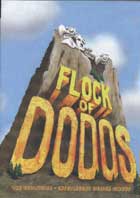
Flock of Dodos: The Evolution-Intelligent Design Circus 2006
Distributed by Documentary Educational Resources, 101 Morse Street, Watertown, MA 02472; 617-926-0491
Produced by Ty Carlisle
Directed by Randy Olson
DVD, color, 84 min.
Sr. High - Adult
Biology, Evolution, Political Science, Science
Date Entered: 03/20/2007
Reviewed by Mike Boedicker, Danville Public Library, IllinoisFlock of Dodos is billed as the first feature-length documentary to explore the volatile conflict between evolution and intelligent design (ID). While the issue in some form has raged for decades (most famously in the Scopes Trial of the 1920’s), it has now “evolved” into a less transparently religious battle. Unlike traditional creationists, ID proponents often accept scientific estimates of the earth’s age and even concede the biological adaptation of organisms. But ID supporters differ sharply with evolutionists by embracing “irreducible complexity,” the notion that some biological systems are so complex and well-designed that they could not have evolved gradually and naturally; there must have been a designer, usually assumed to be God. Hence, intelligent design has been dismissed as “creationism in a cheap tux” by more than a few in the scientific community.
In his lighthearted and humorous film, director and evolutionary ecologist Dr. Randy Olson talks to ID supporters in his home state of Kansas and in Dover, Pennsylvania -- two lightning rods in the debate because of recent efforts to downplay the significance of Darwin in public schools. On the opposing side, he brings together a group of eight friends, all scientists, for a game of poker and a spirited discussion of the issues. The result is an approachable, surprising work that is less a polemic defending evolution and more an exploration of deeply-held beliefs and biases.
The ID supporters Olson interviews are a diverse group – school board members, lawyers, journalists and scientists, and include such well-known figures as Dr. Michael Behe, a leader in the ID community for his book Darwin’s Black Box. On the whole, Olson finds the ID proponents intelligent, friendly, and articulate. To his surprise, it’s his evolutionist friends who come across as dogmatic and arrogant. At one point, the film’s sound man interrupts the scientists’ lively debate to ask some pointed questions: Why, if the truth is on their side, are they losing the fight? Why are they unable to communicate with laypeople? And why have they allowed their work to be attacked? The scientists turn pensive and offer several convincing explanations: humans crave simple answers to complex questions, so an intelligent designer intuitively makes more sense than a long process of natural selection; people are no longer connected to nature and don’t understand how it operates; evolutionary biologists haven’t “fought the fight” and don’t respect their opponents’ arguments enough to even bother addressing them; and scientists are often perceived as talking down to laypeople. To this, one might add that the ready acceptance of Intelligent Design reflects not only the highly religious makeup of the U.S. but also our low levels of scientific literacy. As one evolutionist notes, most laypeople understand the term “theory of evolution” in the colloquial, not scientific, sense: as a hypothesis, a mere hunch, rather than the time-tested fact it really is. Olson himself finds ID seriously lacking because it can’t advance past the intuition stage into testable hypotheses. Ultimately, in his view, there’s almost no difference between ID and faith.
Olson’s overall conclusion is that scientists need to become better communicators – they need to listen to their opponents and fashion simple, effective responses that are not patronizing. Olson’s filmmaking style reflects this view – he has no partisan axe to grind, and doesn’t grandstand like certain superstar documentarians. Though he strongly disagrees with the ID supporters, he takes the time to listen to them, and does not summarily dismiss or ridicule their views. He also uses animation, folksy music, and a breezy editing style to make the film an entertaining exploration and not the dry exercise it could have been.
With a balanced, humorous approach making it accessible to most audiences, Flock of Dodos is a great discussion-starter and highly recommended.